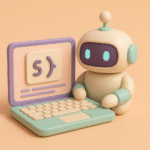
Is It Still Worth Learning to Code in 2025?
AI is Writing Code—So Why Bother?
If you believe the headlines, AI has already taken over coding. ChatGPT, GitHub Copilot, and countless AI-assisted tools can generate functional applications in seconds. Some people argue that learning to code is a waste of time when AI can just do it for you.
But is that really the full picture? Or is it a misleading illusion—one that makes coding look obsolete while actually making it more valuable than ever?
Let’s break it down logically.
AI Won’t Replace Coding—It Will Replace Coders Who Ignore AI
I don’t just think coding is still relevant—I think it’s more important than ever. But here’s the catch: how we learn coding has changed.
We no longer need to sit through endless tutorials memorizing syntax, only to freeze up when it’s time to build something real. AI isn’t replacing coding—it’s replacing outdated learning methods.
Low-code and no-code solutions once seemed like the future—but in reality, they’re a temporary advantage. Once everyone can use them, what’s the real edge? The people who still understand coding fundamentals will be the ones innovating, scaling, and solving real problems.
AI-generated code isn’t perfect yet. But that’s exactly why prompt engineering—not memorized syntax—is the new skill set that separates effective developers from those who are just copy-pasting outputs.
AI-Generated Code: A Crutch or a Shortcut?
A common argument against AI coding is that it’s unreliable and will make people lazy. If you don’t understand the code, how will you debug it?
AI can generate buggy, inefficient code—but so do experienced developers. Dismissing AI on that basis alone is ridiculous. When I first started using AI for coding, I ran into errors frequently. But that was because I was simply copying and pasting AI-generated code without adjusting it to my needs. Over time, I noticed AI could rewrite variables, change programming languages mid-conversation, and even introduce inconsistencies.

Better prompting certainly helps reduce errors, but it’s not just about prompt engineering. Just like experienced developers have techniques for writing, modifying, and debugging their code, AI developers need techniques to work effectively with AI. Here are three key strategies that improve AI-generated code:
- Use a coding profile document – Tell AI upfront about your project, preferred tech stack, and coding style so it generates consistent results.
- Comment your code as prompts – Adding structured comments before and after sections helps AI “remember” the purpose of your code blocks.
- Optimize error handling – Instead of asking AI to debug randomly, ask it to build in structured error handling from the start.
When beginners hit an error, they don’t need years of experience to debug. They just feed the error back into AI and learn by doing. Coding isn’t dying—the way we approach debugging is evolving.
No-Code Looks Easy—Until You Hit a Wall
Many businesses now rely on no-code and automation tools. Some argue that knowing how to integrate APIs and automation is more valuable than coding itself.
I disagree—no-code is deceptive. It’s easy to start but harder to scale. The moment a business wants customization, performance optimization, or AI-powered features, the limitations of no-code become clear.
Even if you’re not the one writing the code, thinking like a developer—understanding logic, loops, conditionals, and data structures—will be the key to long-term innovation. Business leaders who ignore this will get left behind.
AI Engineers: The New Breed of Developers
Here’s a reality check: coding in 2025 isn’t about manually writing thousands of lines of code. It’s about understanding how to use AI effectively.
This is exactly why AI developers (sometimes called AI engineers) are the future. They don’t just code traditionally—they orchestrate AI, fine-tune prompts, and integrate AI models seamlessly. It’s the same shift we saw with web development.
There was a time when developers needed to write HTML, CSS, and JavaScript from scratch to build even simple websites. Then frameworks came along. Today, no serious software developer codes entire websites from scratch—it’s inefficient.

AI is simply the next framework for development. The fundamental concepts remain the same—but those who learn to use AI effectively will have the faster, more scalable, and ultimately more powerful approach.
Ignoring AI won’t just slow you down—it will make you replaceable.
Coding in 2025: A Path to Security or Competitive Edge?
So, is learning to code in 2025 just about job security? Or is it a way to stay ahead of the curve?
The answer is both.
For those in jobs, coding skills will be job security, because knowing how to work with AI will set them apart. But beyond that, coding at its core isn’t just about writing code—it’s about solving problems.
The problems that code solves—repetitive tasks, inefficiencies, scaling issues—aren’t going away. If anything, they’ll increase as AI becomes the norm, not the exception.
Those who know how to think like developers—how to structure logic, analyze patterns, and optimize workflows—will always be ahead of the game. Whether they code every line themselves or orchestrate AI, they’ll be the ones innovating.
Final Thoughts: Learn to Code—But Learn It Differently
So, is learning to code still worth it in 2025? Absolutely. But don’t waste time drowning in syntax tutorials. Instead:
- Master coding concepts – Learn how loops, conditionals, functions, and APIs work.
- Develop prompt engineering skills – AI is a tool, but it only works as well as your inputs.
- Think like a problem-solver – Focus on how coding helps solve real business and technical challenges.
Coding isn’t dead. It’s just evolving. The real question is—will you evolve with it?





